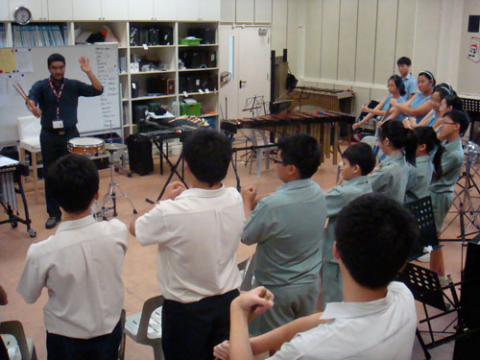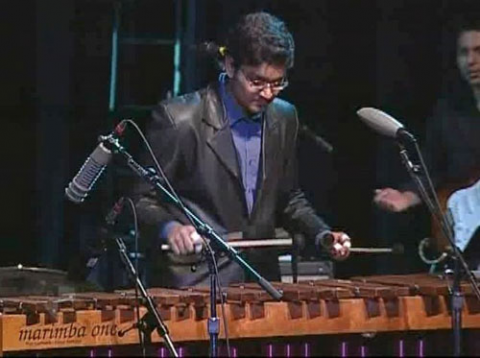Alumni Profile: Ramu Thiruyanam '09

Ramu Thiruyanam conducts a clinic for secondary school students as part of a percussion festival in Singapore.
Photo courtesy of the artist
Ramu Thiruyanam once had his sights set on a career in computer science, but when the market for that field went sour in his native Singapore, he followed his other passion: music. That led him halfway across the world to Berklee, where he studied music education, thanks to the support of the National Arts Council, Singapore.
Now the percussionist—who specialized in marimba and vibraphone at Berklee—is back in Singapore getting some teaching experience and performing, with a schedule packed enough to make anyone's head spin except for his own; at one point while at Berklee he sat in on several classes in addition to his official course load just to satiate his musical curiosity.

Ramu Thiruyanam '09, a music education major, combines performance and teaching.
Here's a sampling of what the 2009 graduate is up to these days: percussion ensemble instructor for concert bands at more than a dozen secondary schools and junior colleges; appointed by the Ministry of Education as resident percussion tutor for the Music Talent Development Program (Secondary Schools); instructor/mentor for a group of students for an international jazz festival, Mosaic Music Festival; solo performer using a MalletKAT, a MIDI controller for percussion; percussionist with the Philharmonic Winds Singapore; and performer with the OrkeStar Trio Featuring Ramu Thiruyanam, an ethnic jazz fusion band including Javanese flute and gambus.
The following is a condensed and edited version of our conversation.
How did Berklee help prepare you for your career?
One thing I learned from the music ed classes is that no matter how much you plan for a lesson, the lesson isn't always going to go according to plan, and to always have a backup plan. I also learned how to teach the same point in different ways—something I definitely applied when I came back to Singapore. Prior to Berklee, I would teach only one method. I've realized I've become a more patient teacher. That's for sure. Back in the day, I would say, "This is how it has to be done. This is the way I see it."
Berklee pushed me to be as ambitious as I am. The teachers always kept pushing me. I asked [percussion professor] Victor Mendoza: What do you think of me trying to do techno music with the marimba? Victor actually entertained the idea for awhile. He said, "Why don't you try sequencing a back track and then play a piece on top of that?" He kept pushing me to try new things. The idea of trying new things is something I now instill in my students. If a student has a hard time trying to figure something out, I'll suggest trying it a different way. Berklee taught me how to teach outside the box musically.
How did Berklee expand your musical horizons?
I took Mallet Keyboard Musicianship with [ensemble professor] Dave Samuels. I took that my first semester because before I came to Berklee, I was a pure classical player and didn't know what a C7 chord was. I didn't know how to improvise.
Dave had us analyze Bach tunes. I found out that changes that Bach wrote for a violin piece were actually the exact same changes to the tune "All the Things You Are." That kind of blew my mind. I didn't know Bach was improvising back then. Dave tried to tell us that we as classical musicians tend to look at jazz in a completely different light when in fact jazz and classical music are interrelated. That was one day that changed my life forever.
From then on, with every single genre of music I see, I try to see the connection between a particular genre or even a different cultural piece of music; I see if it can relate to what I'm playing or I try to do a sort of a fusion thing. I'm doing that now with the OrkeStar Trio. We write most of our own tunes but infuse a little bit of Latin jazz, a little bit of classical lines, and a lot of improvisation in between.

Ramu Thiruyanam performs at Berklee.
Why is Berklee a good place to study music education?
It's one place where you can get a contemporary music education degree compared to most conservatories. Through Berklee, you get the chance to teach students in middle school and high school harmony and rhythm using tunes by artists like Lil Wayne and Taylor Swift. The students immediately react when you give them what they like. It's a totally different perspective. Berklee is a place that allows students to try different things, using different methods to teach kids. Berklee also gave me a broader understanding of the different genres of music.
Please talk about how you transitioned from being a student at Berklee to a music career.
I would say that the one most important thing I did every time I flew back to Singapore during the semester and summer breaks was to network. Meeting up with possible employers, performing, and doing part-time gigs definitely paid off. I even managed to squeeze in some time to conduct clinics or workshops for some schools during my semester and summer breaks, and I definitely gained a lot of experience from doing so.
While I was in school, I always kept in contact with the people I used to work with or perform with, to let them know what my future plans were and ask if there were any job openings. In the long run, it definitely paid off, as I was immediately offered jobs the moment I was back in Singapore, and I consider myself very lucky.
How do you manage your time with such a busy schedule and manage to stay sane?
Effective time management is key. There are sacrifices that I would have to make and am still making so that I can stay on top of my game. I've had to cut down the amount of time spent watching television as well as on the computer, and I even had to cancel the amount of time spent hanging out with friends and family at times, which can be a little frustrating. However, in life there always has to be some sort of balance, and I believe in rewarding myself when I've accomplished certain musical goals during a practice routine or after a major concert or after a long week of intense back-to-back teaching.
I know it may sound weird coming from a musician, but during the times when I take a break or relax, I tend to shut off music completely and take a "sound"-break. During this time, I sit in a quiet place to listen to the silence around me. As musicians are always bombarded with all sorts of sounds at any given point in time, I feel that there is a need for musicians such as ourselves to listen to the silence and to learn from it, as it definitely helps to clear the mind and it allows me to process my thoughts in a more organized manner. Music isn't all about the fast runs or cool changes; the "rests" or silence in a piece can make all the difference in the world.




